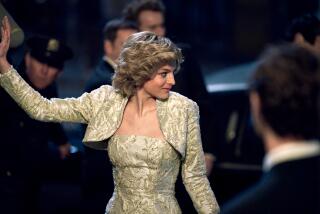He’ll Never Have Tea in This Town Again! London Says : Politics: Ex-official’s tell-all tale of Thatcher’s downfall creates a stir. Few fellow Tories escape unscathed.
- Share via
LONDON — British political dinner parties are noted for wicked tongues and barbed depictions of those in public life--but the juicy, cutting remarks tend to circulate privately and rarely get into contemporary print. And the memoirs of government officials often lack sting.
But these days, the British political world is braced for a full-frontal assault by former Conservative government minister Alan Clark, whose diaries covering his days of service in the Thatcher government are about to be published.
Already, the public has been given a taste of the book by the Mail on Sunday. It created a sensation; the detail and intimacy of the 65-year-old Clark’s record of private conversations with Britain’s most senior decision-makers, many of whom still hold high office, have deeply rankled the governing classes.
The etiquette, propriety and usefulness of such kiss-and-tell revelations have been hotly debated on talk shows and in newspapers.
Sir Robin Butler, a Cabinet secretary, has written Clark demanding that the names of civil servants be removed, citing an unenforceable rule that former ministers are expected to submit memoirs and diaries to his office before publication.
In a first installment of a preview being serialized by the newspaper, Clark gave his version of the tense two-week period leading to Margaret Thatcher’s resignation as prime minister in November, 1990. In his chronicle of bitter, malicious infighting, few of his ministerial colleagues escape his vitriolic pen.
Clark was a minister of state, or deputy minister, for defense procurement at the Defense Department at the time. A staunch supporter of Thatcher, he was appalled by the sudden movement to unseat her as Conservative Party leader.
He describes former Defense Secretary Michael Heseltine, who led the campaign, as “cunning and single-minded. But a bit, well, dyslexic.” He wrote of Heseltine’s “galvanized, jerky movements” and said he had previously displayed “persecution mania.”
As the vote by parliamentary Conservatives approached and tension built, Clark sensed that Thatcher’s associates were lining up against her. Everyone was worried about his own political skin, Clark wrote in his diaries, and Thatcher loyalist Norman Tebbit was “wildish and gaunt,” insisting that no compromise candidate be sought to oppose Heseltine.
Thatcher, at this critical juncture in late November, was attending a summit conference in Paris. She had left her parliamentary secretary, Peter Morrison, in charge of rounding up votes for her.
Morrison, Clark writes, was “calmly confident,” although Clark and others were not. They speculated whether then-Chancellor of the Exchequer John Major could outflank Heseltine, “that dreadful charlatan.”
Heseltine, in rounding up votes inside Parliament, was “quite shameless in offering all and sundry what they have always (politically) wanted.”
Clark wrote that the day before the vote on the leadership, he decided to seek out Morrison to warn about the opposition’s strength.
“I listen outside the door. Silence. He was asleep, snoring lightly, in the leather armchair, with his feet resting on the desk. Drake played bowls before the Armada and all that, but I didn’t like it. This was 10 minutes past 3 on the most critical day of the whole election.”
Awakened, Morrison responded: “Quite all right, old boy, relax. Look, do you think I’d be like this if I wasn’t entirely confident?”
Clark recorded his thoughts as he left: “Peter is useless. Now he’s sozzled. There isn’t a single person working for her who cuts any ice at all.”
When the vote was announced the next day--Thatcher led Heseltine but fell four votes short of the majority needed to win outright--Clark reflected: “Four votes--that was all there was in it. I get so cross when I remember Peter Morrison asleep in his office. For want of a nail, a kingdom was lost.”
Late that evening, several ministers discussed a stop-Heseltine strategy. Norman Lamont, who was sacked as chancellor of the Exchequer in a Cabinet reshuffle last month, mused that Heseltine might be an effective prime minister after all.
Chris Patten, now governor of Hong Kong, replied: “Well, he’s not mad. I mean, after you’ve had a meal with him, you don’t get up from the table and think, ‘That fellow was mad,’ do you?”
When Clark mentioned his own boss, then-Defense Secretary Tom King, as a possible candidate for prime minister, “Chris Patten laughed, and John Patten (then Home Office minister) said, ‘I presume you’re joking.’ ”
Of the meeting, Clark wrote in his diary, “The really sickening thing was the urgent and unanimous abandonment of the Lady.”
As Thatcher pondered whether to continue the fight through a runoff vote, Clark met briefly with her in private. She told him that she was still prepared to fight.
“That’s wonderful,” he replied. “That’s heroic. But the party will let you down.”
“I’m a fighter,” she said.
“Fight, then. Fight right to the end, a third ballot if you need to. But you lose.”
“It’d be so terrible if Michael (Heseltine) won. He would undo everything I have fought for,” Thatcher said.
“But what a way to go!” Clark said. “Unbeaten in three elections, never rejected by the people. Brought down by nonentities!”
The next morning, Thatcher announced her intention to step down. In the second leadership ballot, Major led Heseltine and Foreign Secretary Douglas Hurd by a wide margin. They immediately conceded, and Major became party leader and prime minister.
Late that evening, Clark ran into Heseltine on a back staircase to the private sitting room for members of Parliament. “There, quite alone, wild-eyed and head to head, stood Heseltine. He was a zombie, shattered.”
Roy Hattersley, former Labor Party deputy leader, was moved by the first installment of the diaries to comment: “Mr. Clark seems to suffer from the most vulgar and insecure of compulsions, the desperate need for publicity.”
But Tory Member of Parliament Julian Critchley observed: “It is all very dramatic stuff. It is readable because it is full of so much hate. What is so remarkable about the Conservative Party is the extent to which we hate each other.”
He added: “I don’t know how many friends Alan is going to have left when it is all over. Who is he going to lunch and dine with over the next few months?”
More to Read
Sign up for Essential California
The most important California stories and recommendations in your inbox every morning.
You may occasionally receive promotional content from the Los Angeles Times.













